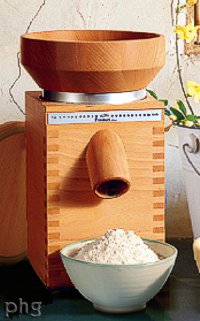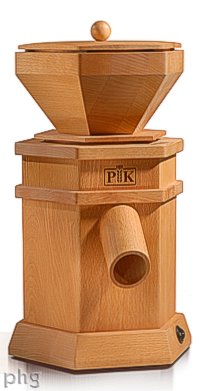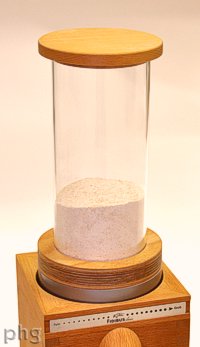Without a doubt, KoMo grain mills are among the most exquisite, elegantly designed pieces of kitchen equipment I have ever laid eyes upon. As I’ve been examining all the grain mills on the market of late to replace the nearly worn out mill I currently use, the KoMo grain mills stood out to me as some of the best and most beautiful available.
 Most grain mills on the market today are constructed using a combination of stainless steel and plastic, but not the KoMo grain mills!
Most grain mills on the market today are constructed using a combination of stainless steel and plastic, but not the KoMo grain mills!
Designed by Wolfgang Mock of Germany, KoMo grain mills are constructed of sustainably sourced, solid native beechwood and finished with organic oils to add not only stylish simplicity to your kitchen counter, but warmth and sophistication as well.
For the traditional cook, KoMo grain mills indeed represent the perfect blend of classic, ancestral function with modern design and convenience.
KoMo: Grain Mills for a Lifetime
The modern trend with appliances is for them to last approximately 5 years which is the average time a family remains in a particular residence.
KoMo grain mills represent a refreshingly different approach to this throw away mentality. The excellence and precision of German engineering and construction with only the finest materials means that your personal KoMo grain mill can be expected to last a lifetime with normal use.
You can even plan to bequeath it to one of your children or grandchildren one day as a treasured family heirloom!
KoMo Millstones Provide Durability with Quiet Performance
 25 years ago, German inventor Wolfgang Mock began experimenting with various combinations of crystal and ceramic to develop an extremely robust new millstone. The resulting stone he created combines corundum and ceramic for an extremely rough surface that barely wears down at all after many years of use. These superior millstones used in all KoMo grain mills not only grind grain quickly but are virtually indestructible.
25 years ago, German inventor Wolfgang Mock began experimenting with various combinations of crystal and ceramic to develop an extremely robust new millstone. The resulting stone he created combines corundum and ceramic for an extremely rough surface that barely wears down at all after many years of use. These superior millstones used in all KoMo grain mills not only grind grain quickly but are virtually indestructible.
A patented milling mechanism that features noise dampening suspensions eliminates the loud grinding noise of most other grain mills so that you can grind virtually anything without irritating your ears or your nerves!
- Wheat – both hard and soft
- Oat groats (rolled, steel cut and stone ground)
- Rice, including wild rice
- Triticale
- Kamut, spelt, einkorn
- Buckwheat
- Barley and rye
- Millet and teff
- Quinoa and amaranth
- Sorghum
- Dent (field corn)
- Dry beans and lentils
- Spices
 KoMo Grain Mills Feature a Flour Sifting Attachment
KoMo Grain Mills Feature a Flour Sifting Attachment
One of the most time consuming aspects of grain grinding is sifting the fresh flour either to remove the bran for easier digestion or simply to produce a lighter baking result. The bran that is removed can be fed to your chickens or added to soups, smoothies, and other kitchen creations as desired.
KoMo grain mills eliminate this tiresome and frequently messy task by providing an attachable sifting mechanism which includes interchangeable stainless steel screens in medium, fine and extra fine mesh sizes.
KoMo Grain Mills: Socially Responsible Manufacturing
The most surprising and appealing aspect of KoMo grain mills to me besides the quality craftmanship is the focus of the company on a socially responsible manufacturing process.
For many years, KoMo has partnered with a non-profit workshop program located in western Austria which provides employment to able bodied individuals as well as those with disabilities. An enormous pride of workmanship is present in this organization which employs modern management techniques and the latest precision machinery to manufacture the hardwood housings of all KoMo grain mills.
Where to Find KoMo Grain Mills
As you can imagine, not just any retailer would carry KoMo grain mills which I have dubbed “the Mercedes of grain grinders!”
The best and most comprehensive selection of these gorgeous appliances that I’ve discovered is Pleasant Hill Grain. With loads of detail and pictures about every aspect of the premier grain mills they offer, this is the site to send your sweetie if you have a classic grain mill on your holiday or birthday wish list!
If you are just beginning your research on which grain mill to buy, be sure to like Pleasant Hill Grain on Facebook so that you receive timely updates on any KoMo specials and news that might impact your purchase decision.
I hope you’ve enjoyed my analysis and review of the KoMo line of grain mills as I go on the hunt for one myself. Purchasing a grain mill is a big investment in your health and gathering all relevant information to make the best possible decision is of paramount importance!
The above is a sponsored post, paid for by Pleasant Hill Grain, however, it is clear that I really believe the KoMo grain mills are a cut above and represent some of the most quality mills on the market today!


Am I understanding you correctly? You are recommending a product but you haven’t personally tried it?
This was what I was wondering. And, it doesn’t sound like you have finalized your decision on which mill you are going to purchase. Hopefully you have plans to let us know once you do – thanks!
this is the first I’ve heard of separating the bran from freshly ground flour … I thought we were grinding our grain fresh so we could get the WHOLE grain … didn’t realize that it was the bran that was hard on the digestion! I promise I don’t live under a rock – I work hard to keep up on the latest healthy food news! But I am definitely going to have to try sifting out the bran. Would you still soak your grains even if you’ve sifted out the bran? Please tell me more! Thanks!
would I forever ruin it for grain if used it to crush garlic?
I have one of these and love it. They do have a range of prices, the lower end models are beechwood laminate, and the higher end are solid beechwood. They carry electric and manual. I bought an electric grain mill, as I read it is difficult to grind grain by hand. However, it is not difficult to roll grain by hand, so I hope to purchase a manual grain roller soon. I find warm grain makes for better product, so I grind fresh before each baking. I also keep a gallon bag of flour in the freezer for when I need just a small amount.
I have the komo pk pictured above, and have had itfor a year and a half. I have ground sprouted wheat in it.
I thought I read in my booklet NOT to grind beans and corn in it. I may be wrong, but I thought I read that.
I bought it because of the look and the noise factor.
Valerie. You can grind corn (called field or dent corn) in it, but NOT popcorn. I have no idea why–maybe the shape getting caught in the round hole for the grinding stones. As for beans, I don’t recall if they are ok. but if you go to the pleasant hill grain site, they give you ALL the details of allowable grinding. And in most grinders, no seeds are allowed. I do field corn in mine on a coarse grind for grits. Hope this helps.
Any info on how well it does with sprouted grains? I’ve had my eye on this mill for a few years now but haven’t wanted to splurge on it yet though my grain attachment on my vitamix is a pain to use but does the job (aside from heating and sweating a lot). It would be awesome if you did a comparison of available mills on the market and pros and cons!!! 🙂
As long as the sprouted grain has been thoroughly dried in a dehydrator or warm oven (no higher than 150F) before grinding into sprouted flour, then yes the KoMo would work fine.
when i read your email/ went to your post, I said ‘i’m in love’ TOO!!!! lol
I have the KoMo fidibus medium. I absolutely LOVE it!! Its money well invested if you grind your own flour. There’s no cleanup and its nice enough to stand on your counter ready to use when you need it!
Don’t have to “dream” here…I’ve have had a Salzburger mill here at home for YEARS!!!
Can someone compare the Komo to a Salzburger mill. I like that the Salzburger uses granite stones and solid wood in the Carina. Does Komo have something comparable for a similar price?
I am about to order a Salzburger myself since my Champion went kaput very unfortunately. After researching grain mills the Salzburger seems to be the ABSOLUTE CADILLAC! Can’t wait to own one!! You’re funny when you said, “Don’t have to ‘dream’ here…” lol
That’s great for Austrians, but, what about Americans?
I assume this also requires electricity to operate?
What about a Retsel, Country Living, or Grain Maker – ALL made in the USA.
My personal preference is to support any company regardless of location that is producing a quality product and doing right by the environment and its workers.